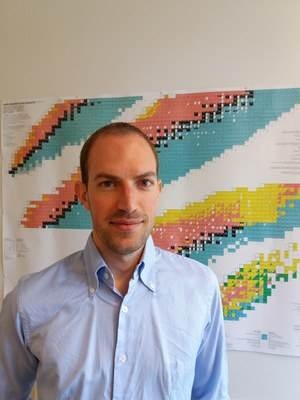Jun 4 2019
Modeling the properties of atomic nuclei, which is a demanding job, necessitates a theory that can be applied to a wide range of nuclear species irrespective of their masses.
 Gianluca Salvioni, University of Jyvaskyla. (Image credit: University of Jyvaskyla)
Gianluca Salvioni, University of Jyvaskyla. (Image credit: University of Jyvaskyla)
The doctoral dissertation of M.Sc. Gianluca Salvioni on theoretical nuclear physics endeavors to formulate such a theory with the help of inputs from accurate first-principle calculations available for light nuclei.
The atomic nuclei represent a useful field for investigating the fundamental forces of nature as much as a challenge for theoretical and experimental physics. Experimental facilities, such as the accelerator laboratory at the University of Jyväskylä, enable the production and measurement of radioactive nuclear species, braving against the short lifetimes and exotic nature of these systems.
It is well known that the nucleus is composed of nucleons (protons and neutrons) that interact via what are called strong interactions. As per the current understanding, these interactions behave like chiral effective interactions—forces caused as a result of the symmetries of the basic components of quarks, nucleons, and gluons. Calculations performed using ab initio techniques are based on first principles, according to which all nucleons are active and interact with these chiral forces.
Since there is a need for large computational resources, such calculations can be performed only for a restricted number of light nuclei. More approximations are required to elucidate all of them, and thus, one often tends to substitute the ab initio techniques by models rooted in what is called the density functional theory.
In his dissertation, Salvioni deduced parameters of nuclear functionals from ab initio calculations with chiral interactions. Specifically, he introduced perturbations to ground-state configurations of seven light nuclei, and from the reactions to the perturbations, he assessed the significance of the parameters of functionals. In addition, he tested these parameters against characteristics of infinite nuclear matter.
His research is a step forward to enhancing the accuracy of nuclear functionals, associating them with fundamental interactions. This offer significant inputs to set the limits of the bound nuclear species and to investigate a range of nuclear phenomena.
Gianluca Salvioni received his M.Sc. Degree in theoretical physics from the University of Pisa (Italy), in 2014, with a dissertation about knockout reactions from exotic nuclei. He started his doctoral studies at the Department of Physics of the University of Jyväskylä in 2015, joining the FIDIPRO research group. His research has been supported by the University of Jyväskylä and the Helsinki Institute of Physics.